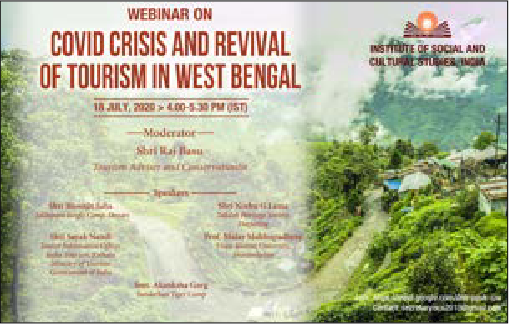The Webinar titled “Covid Crisis and Revival of Tourism in West Bengal”, held on 18 July , 2020 commenced with the inaugural address of Kankana Roy on behalf of Institute of Social and Cultural Studies, where she herself introduced the audience with the speakers and thereafter implored the coordinator of the Webinar Mr. Raj Basu to conduct the session. Mr. Raj Basu, Tourism Advisor and an eminent Conservationist focused his speech on the impact of the pandemic Covid 19 and its effect over the travel and tourism industry. He opined that rethinking 29
about travel and tourism in the post corona scenario was important because this industry had a huge potential to create new jobs. He praised the initiative of the Government of West Bengal and the Government of India with special reference of the Indian Tourism Kolkata for patronizing and promoting tourism industry in West Bengal.
Mr. Sayak Nandi, Tourist Information Officer, India Tourism Kolkata assured that India Tourism Kolkata through their initiatives had always tried to increase the employability in the hospitality industry of eastern India. But he
regretted that due to the on-going pandemic such initiatives received a major setback. He commented that Bengal, being a key market for the tourism industry , the reliable data showed how inflow of tourists in Bengal decreased during the pre-pandemic period.
He discussed about the safety protocols issued by the government for the tourism industry to ensure safety of the tourists and to prevent any form of pandemic outbreak in areas adjacent to the tourist spots. He educated the audience about the various initiatives taken by the government to encourage skilled individuals and fresh creativity in tourism industry. Mr. Norbu Lama, Takdah Heritage Society, Darjeeling, primarily focused on the concept of Home Stay and discussed how Takdah a remote village in Darjeeling had become a successful model of the home stay concept. He opined that home stay had immensely helped the people of the local region . It not only improved the economic condition of the village but also boosted self-confidence and positive attitude of the local people of Takdah .
According to him , rural tourism had become a form of sustainable tourism. He recommended new concept like healing tourism which could play an important role and wished that in the post Covid-19 situation tourists would stay for a long time and would enjoy the regional culture and cuisine . Mr. Biswajit Saha ,Jaldapara Jungle Camp , Dooars, initiated his discussion by sketching the transformation of Dooars from a site of illegal poaching of animals and timber trade to a popular tourist destination. He pointed out the initiatives and role of the Association of Conservation and Tourism (established in 1991), who educated the poor people of the region against cutting down of trees for short term monetary gains and involved them in their afforestation programme. He assured that the tourism industry in this region not only had strictly maintained the Covid -19 prevention guidelines but also had organised on a continuous basis the local awareness campaign programmes to educate
common people that the tourists were not corona carriers ,a potential danger for the local community. 30
Professor Malay Mukhopadhyay, Viswa Bharati University, Shantiniketan, discussed in details the various aspects of Edu- tourism in Bengal .
He emphasised on the understanding geographical landscape of the region which he believed would be the pre requisite towards responsible and sustainable tourism. Sustainable tourism would not only help in emphasizing the distinctive physical and socio-cultural aspects of a place but also enhanced the well-being of the locals. He thereafter discussed the initiatives andendeavors taken by him to encourage Edu- Tourism and Geo-Tourism. He briefly discussed the concept of river trekking and commented that such initiatives would help the trekkers to build up relations with the local people and would help them to have a holistic understanding of the region. He stressed the need of building infrastructure along such river trekking routes where thetrekkers could stay during their course of journey. He thereafter discussed the concept of Marker Stonewhich according to him would identify the source of the river and how it could be developed into a tourist destination.
Ms. Akanka Garg, Sundarban Tiger Camp, emphasized the protocols needed to be followed by the tourism industry during the on-going pandemic. She emphasized the necessity of following the Covid-19 prevention protocols chalked out by the government so that corona virus could not spread to the villages adjacent to the popular tourist destinations. She added that the tourism industry would not only follow the Covid-19 prevention protocols but must effectively communicate and display these protocols so that the tourists had a knowledge about the Covid-19 prevention norms. While summing up the webinar Mr. Raj Basunot only emphasized the importance of effective new policies to revive the tourism industry but also making tourism interesting through new initiatives like river trekking tourism and the concept of healing villages. The Webinar ended with the vote of thanks from Kankana Roy on behalf of Institute of Social and Cultural Studies, Kolkata.





